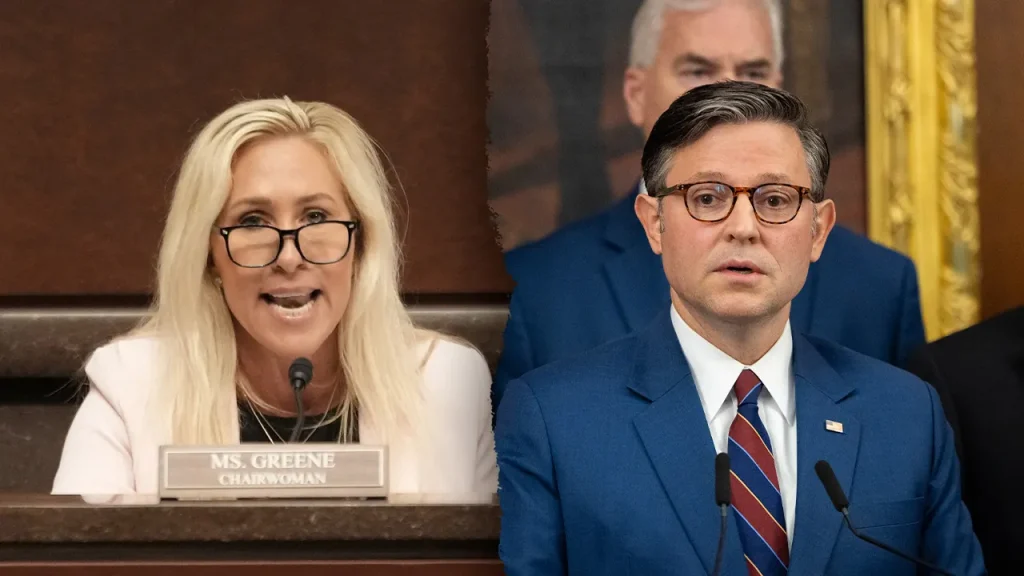House Republicans Face Internal Discord as Government Shutdown Continues
In a revealing Tuesday conference call among House Republicans, tensions flared as Rep. Marjorie Taylor Greene of Georgia directly challenged Speaker Mike Johnson’s strategy for managing the ongoing government shutdown. The confrontation highlights growing friction within the party as the political impasse continues with no clear resolution in sight.
Speaker Johnson has implemented a controversial approach to the shutdown, holding weekly update calls with Republican lawmakers while instructing them to remain in their home districts rather than return to Washington. This strategy aims to pressure Senate Democrats into accepting the GOP’s federal funding proposal. However, during the tense call, Greene forcefully argued that the Republican House majority was “being wasted” by keeping representatives away from the capital. She suggested the party would be better served by actively passing legislation in Washington and finding an “off ramp” to pandemic-era Obamacare subsidies set to expire at year’s end – the extension of which has become Democrats’ primary demand for agreeing to any funding deal.
Greene didn’t mince words, telling House GOP leaders they need to “get out of Washington, D.C., and go back to your districts and talk to real people, because real people are pissed.” She emphasized that constituents expect representatives to fulfill their “legislative constitutional duty” rather than taking “marching orders from the political team at the White House.” Surprisingly, Greene also directed criticism toward former President Donald Trump, noting that despite being one of his earliest supporters, she believes “even the president is losing support.” This comment prompted Johnson to defend both the GOP’s legislative accomplishments and Trump’s continued popularity among the Republican base.
The exchange grew more heated when Johnson defended his leadership during the shutdown crisis, insisting that Republican leaders have been working “around the clock” to resolve the situation. “He’s not sleeping. I’m not sleeping… because we are working tirelessly,” Johnson explained. The Speaker then directly criticized Greene for airing her grievances on social media, asking pointedly, “How does that help us, Marjorie?” This public questioning of Greene’s loyalty to the party’s strategy underscores the growing internal divisions as the shutdown continues without resolution. Most Republican representatives who spoke during the call supported Johnson’s approach, though Reps. Kevin Kiley of California and Dan Crenshaw of Texas joined Greene in expressing concerns about keeping House members away from Washington.
The current standoff stems from September 19, when the House passed a Republican short-term funding bill intended to extend negotiations until November 21. Since then, Senate Democrats have rejected this legislation thirteen times, creating the current deadlock. Despite keeping representatives out of Washington, Johnson argued during the call that Republicans remain actively engaged in their work. Greene, however, has become increasingly vocal about her frustrations, both on the call and through social media. Following the heated exchange, she took to X (formerly Twitter) to confirm her position while the call was still ongoing, revealing she had “demanded to know from Speaker Johnson what the Republican plan for healthcare is” and criticizing his response as inadequate.
This public disagreement between Greene and Johnson represents more than a personal dispute – it reflects fundamental questions about the Republican Party’s governance strategy during the shutdown. With Greene claiming Johnson “refused to give one policy proposal” regarding healthcare alternatives and sarcastically suggesting she would need to enter a “classified setting” to learn about Republican healthcare plans, the exchange highlights significant policy divisions within the party. As the shutdown continues with no immediate resolution in sight, these internal tensions could further complicate efforts to present a unified Republican front in negotiations with Democrats, potentially weakening the GOP’s bargaining position as critical deadlines approach for both government funding and healthcare subsidy extensions.


